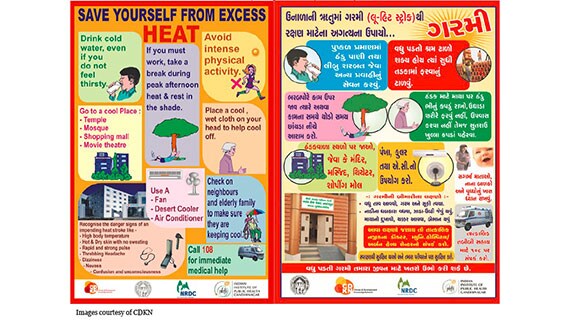
A case study on the extreme heat action plan in India
Beat the heat: Heat health action plan in India
More extreme and frequent heat waves are associated with global changes in climate change. One of the largest single climate change events causing mass mortality was the European heat wave of August 2003 which is known to have caused the deaths of 20,000 people.
Overview
In 2010 a severe heat wave in Ahmedabad, Gujurat India, was estimated to have caused over 1,300 excess deaths. Extreme heat can lead to heat exhaustion and heat stroke, it can exacerbate chronic cardiovascular and respiratory diseases, and make daily tasks and work outdoors harmful or deadly.
Higher daily peak temperatures and longer, more intense heat waves are becoming increasingly frequent at a global level due to climate change.1 This puts particular groups at risk of heat related health issues, including outdoor workers, children, elderly people and poor residents of slum communities.
1 IPCC, "Special Report on Managing the Risks of Extreme Events and Disasters to Advance Climate Change Adaptation," March 8, 2012: http://www.ipcc-wg2.gov/SREX/.


What did we do?
Over the last three years, as part of its role leading the Climate and Development Knowledge Network (CDKN) PwC has been supporting the creation and roll-out of an extreme heat action plan for the city of Ahmedabad, in partnership with the Natural Resources Defence Council (NRDC) and the Indian Institute of Public Health (IIPH), a coalition of academic, health and environmental groups to develop an Extreme Heat Action Plan.
The PwC team working on CDKN supported the development and funding of the programme and provided technical, quality and strategic review of the project, which is centred on enhanced public awareness of extreme heat, an early warning system and heat preparedness planning.
What impact did we make?
The Ahmedabad Municipal Council (AMC) adopted this action plan as part of its annual disaster preparation plan for the city. This has enabled interventions on a broad scale across the city’s municipal agencies. As a result, during the 2015 heatwave, only 7 deaths were recorded in Ahmedabad in comparison to the similar heatwave in 2010 which claimed 1,300 lives.
















